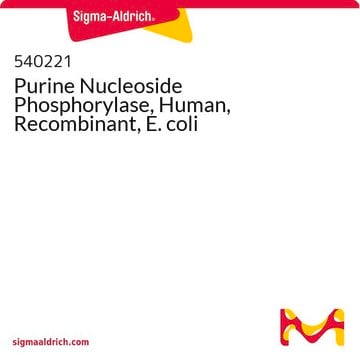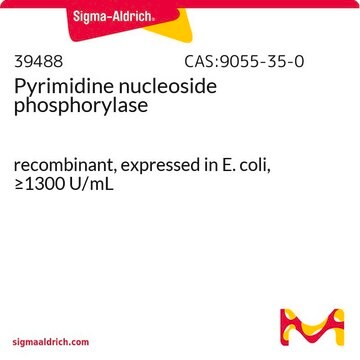Transportation information can be found in Section 14 of the product's (M)SDS.To access the shipping information for this material, use the link on the product detail page for the product.
40809
Purine nucleoside phosphorylase
recombinant, expressed in E. coli, ≥120 U/mL
About This Item
Recommended Products
recombinant
expressed in E. coli
form
buffered aqueous solution (100 mM phosphate buffer with 1 mM MgCl2)
specific activity
≥120 U/mL
storage temp.
−20°C
InChI
1S/C10H12N4O4/c15-2-6-7(16)8(17)10(18-6)14-4-13-5-1-11-3-12-9(5)14/h1,3-4,6-8,10,15-17H,2H2/t6-,7-,8-,10-/m1/s1
InChI key
MRWXACSTFXYYMV-FDDDBJFASA-N
Looking for similar products? Visit Product Comparison Guide
Application
Biochem/physiol Actions
Unit Definition
Storage Class Code
12 - Non Combustible Liquids
WGK
WGK 3
Flash Point(F)
Not applicable
Flash Point(C)
Not applicable
Choose from one of the most recent versions:
Already Own This Product?
Find documentation for the products that you have recently purchased in the Document Library.
-
What is the Department of Transportation shipping information for this product?
1 answer-
Helpful?
-
-
What is the source gene of the purine nucleoside phosphorylase, Product 40809?
1 answer-
Per our supplier, the purine nucleoside phosphorylase,product 40809, is of bacterial origin, specifically from Enterobacter.
Helpful?
-
Active Filters
Our team of scientists has experience in all areas of research including Life Science, Material Science, Chemical Synthesis, Chromatography, Analytical and many others.
Contact Technical Service








